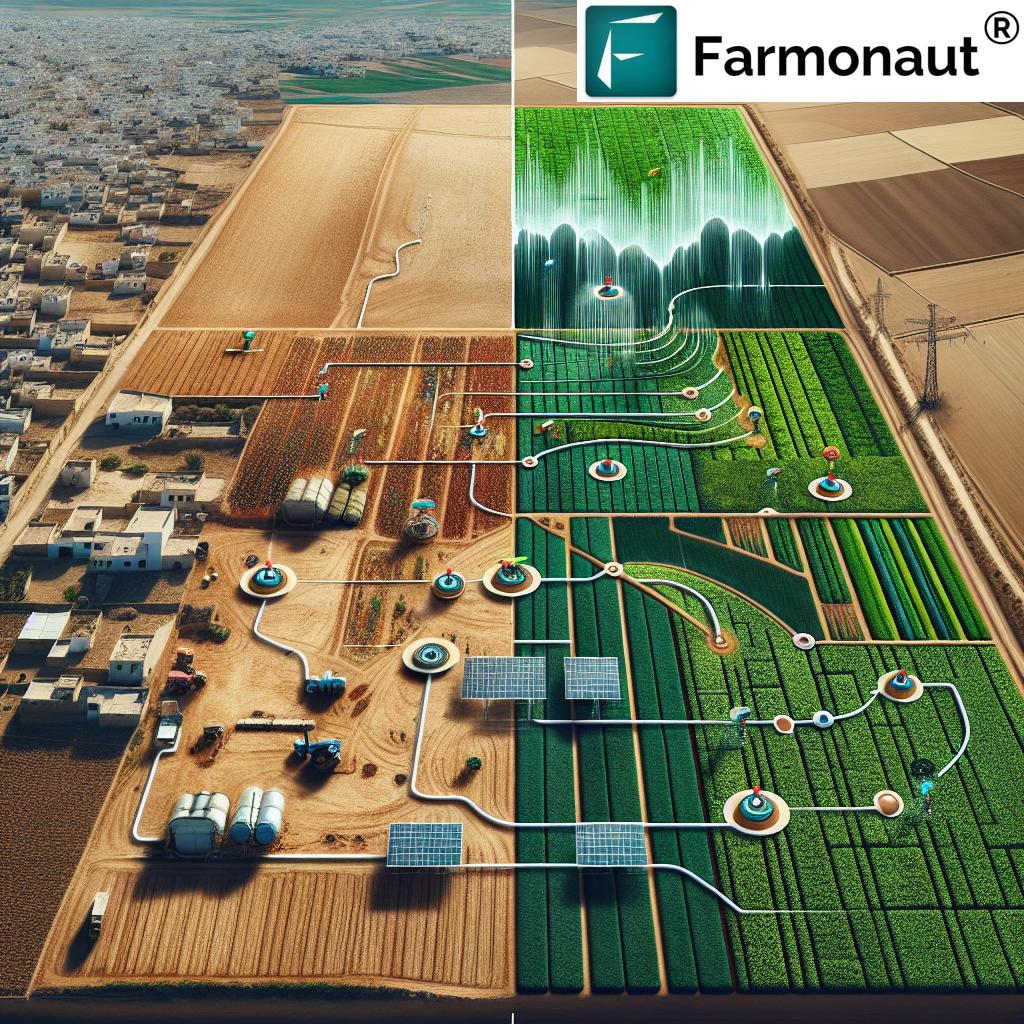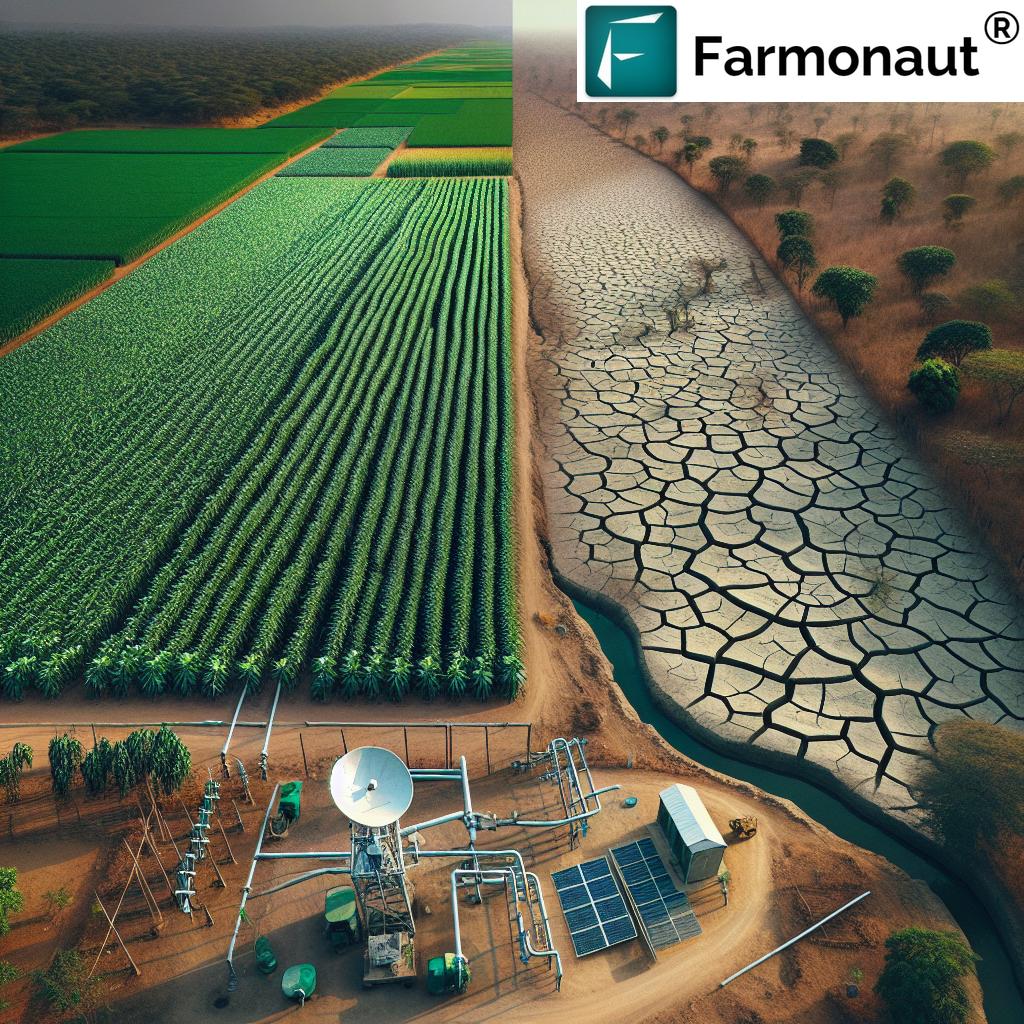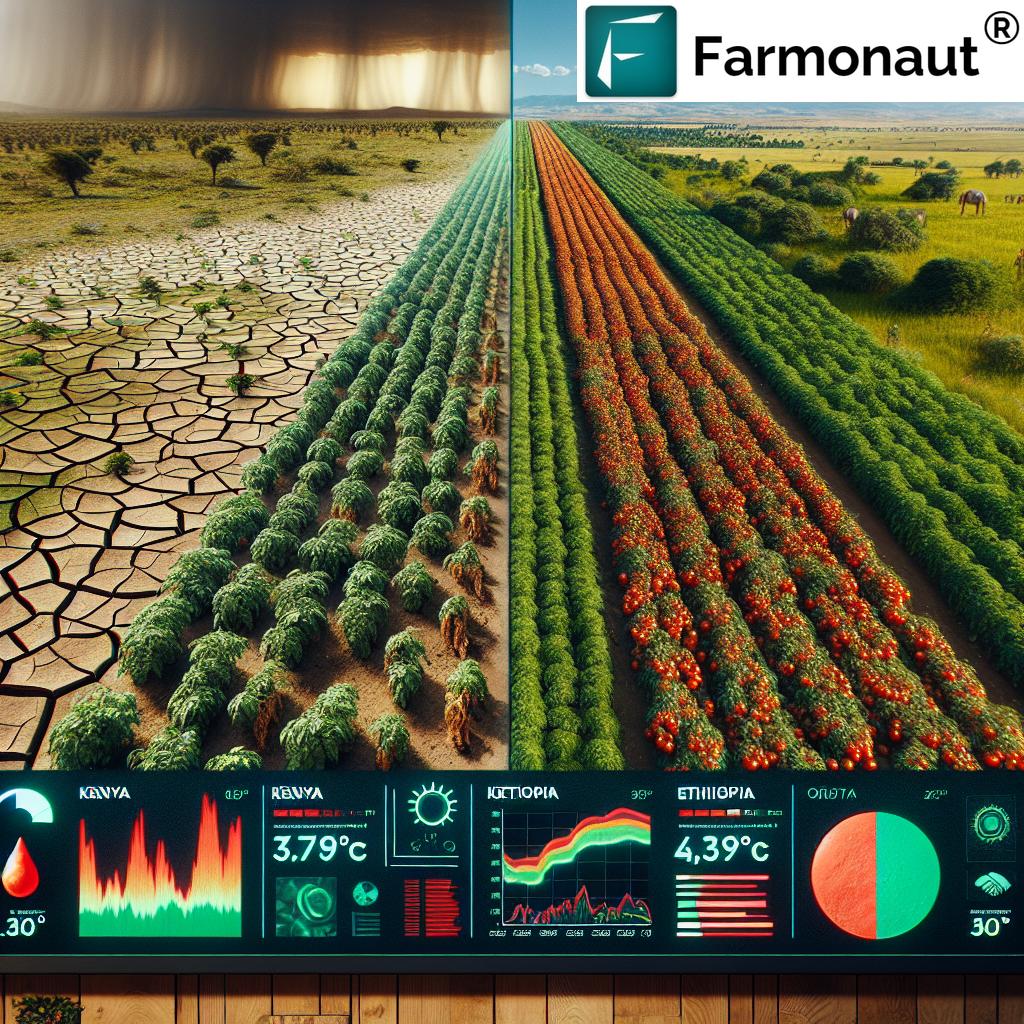Revolutionizing Kenyan Agriculture: Sustainable Practices for Food Security and Economic Growth
“Kenya’s focus on macadamia nut oil production aims to reduce edible oil imports by up to 30% annually.”
In the heart of East Africa, Kenya is embarking on a transformative journey to revolutionize its agricultural sector. We’re witnessing a remarkable shift towards sustainable agriculture practices that promise to enhance food security and drive economic growth. As we delve into this exciting transformation, we’ll explore how innovative agribusiness initiatives are reshaping the landscape of Kenyan agriculture.

The Dawn of Sustainable Agriculture in Kenya
Kenya’s agricultural sector is undergoing a profound transformation, driven by a commitment to sustainability, food security, and economic prosperity. The government, in collaboration with agribusinesses and farmers, is spearheading initiatives that promise to redefine the country’s agricultural landscape. Let’s explore the key elements of this agricultural revolution:
- Value Addition: A focus on processing agricultural products locally, such as macadamia nut oil production
- Smallholder Farmer Support: Collaborative efforts to empower small-scale farmers
- Agricultural Policy Development: Regular stakeholder consultations to shape effective policies
- Water Conservation: Implementing innovative techniques to preserve this precious resource
- Renewable Energy Integration: Investing in clean energy solutions for sustainable farming
These initiatives are not just theoretical concepts; they’re being put into practice across Kenya, transforming the lives of farmers and contributing to the nation’s food security and economic growth.
The Role of Technology in Kenyan Agriculture
As we embrace sustainable agriculture practices, technology plays a pivotal role in driving efficiency and productivity. Innovative solutions like those offered by Farmonaut are revolutionizing farm management and decision-making processes.
Farmonaut’s satellite-based crop health monitoring provides farmers with real-time insights into vegetation health, soil moisture levels, and other critical metrics. This data-driven approach empowers farmers to make informed decisions about irrigation, fertilizer usage, and pest management, ultimately optimizing crop yields and reducing resource wastage.
For those interested in integrating these advanced agricultural technologies into their own systems, Farmonaut offers an API that provides access to satellite and weather data. Developers can explore the API Developer Docs for more information on how to leverage this powerful tool.
Value Addition: The Macadamia Nut Revolution
One of the most exciting developments in Kenya’s agricultural sector is the focus on value addition, particularly in the production of edible oils from macadamia nuts. This initiative not only showcases the potential for reducing imports but also supports local farmers and boosts the economy.
Key benefits of macadamia nut oil production include:
- Reduction in edible oil imports, saving Kenya over Sh200 billion annually
- Creation of new job opportunities in processing and manufacturing
- Increased income for macadamia nut farmers
- Promotion of a healthy, locally-produced alternative to imported oils
This focus on macadamia nut oil aligns perfectly with the National Edible Oil Crops Promotion Project, demonstrating Kenya’s commitment to boosting local production and reducing dependence on imports.
Empowering Smallholder Farmers
“Sustainable agriculture initiatives in Kenya target improving food security for over 80% of smallholder farmers nationwide.”
At the heart of Kenya’s agricultural transformation are the smallholder farmers who form the backbone of the country’s food production. Recognizing their crucial role, various initiatives are being implemented to support and empower these farmers:
- Knowledge Sharing: Regular training sessions and workshops on sustainable farming practices
- Access to Technology: Introducing farmers to tools like Farmonaut’s mobile apps for crop monitoring
- Financial Support: Collaborations with financial institutions to provide easier access to loans and insurance
- Market Access: Creating platforms to connect smallholder farmers with larger markets
These initiatives are crucial in ensuring that smallholder farmers can adopt sustainable practices, increase their yields, and contribute significantly to Kenya’s food security and economic growth.
Shaping Agricultural Policy Through Collaboration
The Kenyan government has recognized the importance of inclusive policy-making in the agricultural sector. By instituting monthly roundtable discussions with various industry players, the Ministry of Agriculture is ensuring that agricultural policies are in tune with current industry needs.
These regular consultations serve multiple purposes:
- Gathering real-time feedback on agricultural practices and policies
- Identifying challenges faced by farmers and agribusinesses
- Facilitating swift interventions to increase productivity and improve yields
- Fostering a collaborative environment between the government and private sector
This collaborative approach to policy development is crucial in creating an enabling environment for sustainable agriculture practices to thrive in Kenya.

Water Conservation: A Key to Sustainable Farming
In a country where water scarcity is a pressing issue, innovative water conservation techniques are becoming increasingly important in agriculture. Kenya is making significant strides in this area, implementing various strategies to maximize water use efficiency:
- Drip Irrigation Systems: Precise water delivery to crop roots, minimizing wastage
- Rainwater Harvesting: Capturing and storing rainwater for use during dry periods
- Soil Moisture Sensors: Using technology like Farmonaut’s satellite-based monitoring to optimize irrigation schedules
- Drought-Resistant Crop Varieties: Promoting crops that require less water
These water conservation efforts not only contribute to sustainable agriculture but also help in building resilience against climate change impacts.
Renewable Energy: Powering Sustainable Agriculture
The integration of renewable energy in agriculture is another crucial aspect of Kenya’s sustainable farming revolution. By investing in clean energy solutions, the country is not only reducing its carbon footprint but also creating a more resilient and cost-effective agricultural sector.
Key renewable energy initiatives in Kenyan agriculture include:
- Solar-Powered Irrigation Systems: Reducing reliance on fossil fuels for water pumping
- Biogas Production: Using agricultural waste to generate energy
- Wind Energy: Harnessing wind power for various farm operations
- Energy-Efficient Processing Facilities: Implementing green technologies in agricultural processing
These renewable energy investments are not only environmentally responsible but also contribute to reducing operational costs for farmers and agribusinesses in the long run.
Kenya’s Potential as a Global Superfoods Leader
With its focus on sustainable agriculture practices, Kenya is positioning itself as a potential leader in the global market for sustainably grown superfoods. This strategic move aligns with growing international demand for healthy, responsibly produced food products.
Factors contributing to Kenya’s superfoods potential include:
- Ideal growing conditions for various nutrient-rich crops
- Implementation of sustainable farming practices
- Investment in value addition and processing facilities
- Strong focus on quality control and international standards compliance
By leveraging these strengths, Kenya can tap into lucrative export markets while also ensuring food security for its own population.
The Role of Technology in Sustainable Agriculture
As we’ve seen, technology plays a crucial role in driving sustainable agriculture practices in Kenya. Platforms like Farmonaut are at the forefront of this technological revolution, offering innovative solutions that empower farmers and agribusinesses.
Key technological advancements include:
- Satellite-Based Crop Monitoring: Providing real-time insights into crop health and soil conditions
- AI-Powered Advisory Systems: Offering personalized recommendations for crop management
- Blockchain-Based Traceability: Ensuring transparency and authenticity in agricultural supply chains
- Precision Agriculture Tools: Optimizing resource use and improving yields
These technologies are not just improving efficiency; they’re also making sustainable farming practices more accessible and financially viable for farmers of all scales.
Economic Impact of Sustainable Agriculture in Kenya
The shift towards sustainable agriculture practices is having a significant positive impact on Kenya’s economy. Let’s explore some of the key economic benefits:
- Job Creation: New opportunities in sustainable farming, processing, and related industries
- Reduced Import Dependence: Saving foreign exchange through local production of crops like edible oils
- Increased Exports: Potential for higher-value exports of sustainably grown products
- Rural Development: Improved livelihoods for farming communities through increased productivity and income
By embracing sustainable practices, Kenya is not only ensuring food security but also laying the foundation for long-term economic growth and prosperity.
Sustainable Agricultural Practices in Kenya: Impact and Benefits
| Practice | Environmental Impact | Economic Benefits | Food Security Contribution |
|---|---|---|---|
| Macadamia Nut Production | Estimated 15% reduction in carbon footprint compared to imported oils | Projected 30% decrease in edible oil imports | 10% increase in local oil production capacity |
| Water Conservation Techniques | Estimated 20% reduction in water usage | 15% increase in crop yields due to efficient irrigation | 25% improvement in drought resilience |
| Renewable Energy Integration | 30% reduction in farm-related carbon emissions | 20% decrease in energy costs for farmers | 10% increase in cold storage capacity, reducing post-harvest losses |
| Smallholder Farmer Support Programs | 10% increase in adoption of sustainable farming practices | Projected 15% increase in smallholder income | 20% improvement in local food availability |
The Future of Kenyan Agriculture
As we look to the future, the prospects for Kenyan agriculture are incredibly promising. The commitment to sustainable practices, coupled with technological advancements and supportive policies, sets the stage for a thriving agricultural sector that can meet the challenges of food security and economic growth.
Key areas to watch in the coming years include:
- Further integration of AI and machine learning in farm management
- Expansion of value-added processing for a wider range of crops
- Increased focus on climate-resilient farming techniques
- Growing export markets for Kenya’s sustainably produced superfoods
With continued investment and innovation, Kenya is well-positioned to become a model for sustainable agriculture in Africa and beyond.
Conclusion
The revolution in Kenyan agriculture is well underway, driven by a commitment to sustainability, innovation, and collaboration. From the fields of macadamia nuts to the implementation of cutting-edge technologies like those offered by Farmonaut, Kenya is charting a course towards a more secure, prosperous, and sustainable agricultural future.
As we’ve explored in this blog post, the benefits of this transformation extend far beyond the farm gate. They touch on critical issues of food security, economic growth, environmental sustainability, and rural development. By embracing sustainable practices and leveraging innovative technologies, Kenya is not just feeding its people—it’s nurturing a thriving agricultural ecosystem that promises to be a cornerstone of the nation’s future prosperity.
The journey towards fully sustainable agriculture is ongoing, but with each step, Kenya moves closer to realizing its potential as a leader in sustainable farming and a beacon of food security in Africa. As we continue to witness this exciting transformation, one thing is clear: the future of Kenyan agriculture is bright, green, and full of promise.
FAQ Section
Q: What are the main sustainable agriculture practices being implemented in Kenya?
A: Key practices include value addition (e.g., macadamia nut oil production), water conservation techniques, renewable energy integration, and smallholder farmer support programs.
Q: How is technology contributing to sustainable agriculture in Kenya?
A: Technology plays a crucial role through satellite-based crop monitoring, AI-powered advisory systems, blockchain-based traceability, and precision agriculture tools offered by companies like Farmonaut.
Q: What are the economic benefits of sustainable agriculture for Kenya?
A: Economic benefits include job creation, reduced import dependence, increased potential for high-value exports, and rural development through improved farmer incomes.
Q: How is Kenya addressing water scarcity in agriculture?
A: Kenya is implementing drip irrigation systems, rainwater harvesting, soil moisture sensors, and promoting drought-resistant crop varieties to conserve water in agriculture.
Q: What role do smallholder farmers play in Kenya’s agricultural transformation?
A: Smallholder farmers are crucial to Kenya’s food security. They are being supported through knowledge sharing, access to technology, financial support, and improved market access to adopt sustainable practices and increase productivity.




















